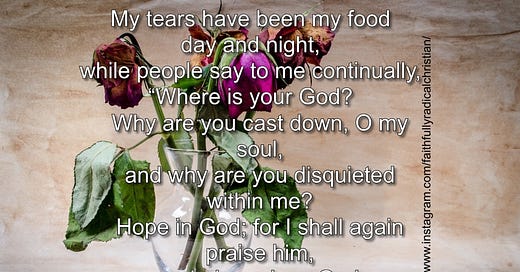Devotional: What Hope Looks Like During a Pandemic
My tears have been my food
day and night,
while people say to me continually,
“Where is your God?
Why are you cast down, O my soul,
and why are you disquieted within me?
Hope in God; for I shall again praise him,
my help and my God.
Psalm 42: 3,11 (NRSV)
Hope is at the cornerstone of Christianity and yet defining it, let alone living it out, seems so elusive to many of us. Some Christians tie hope to blind optimism and willful ignorance. Hope, in this sense, is presented as denying reality and insisting everything is ok when things are clearly not. This type of hope is reminiscent of someone whose’ house is burning down and instead of running around trying to put out the fire, they instead say, “eh, the fire will go out by itself. Not a big deal.” And they continue on their merry way even as the house begins to collapse in flames all around them.
I see this type of false hope in the statements of some Christians who are openly opposed to any attempts to minimize the infection rate of COVID-19. If they even acknowledge the reality of COVID-19, they insist it’s not a big deal. God will protect them and their loved ones. They are confident that if the media, politicians, and health care workers stopped overhyping the pandemic that we would be able to go back to “normal” as quickly as possible. They claim that their lack of concern is based on the fact that they have a strong faith. They argue that because their hope is in God, they don’t need to worry about the pandemic and they don’t need to wear masks, or avoid large crowds, or practice social distancing. Hope for them, means rejecting reality.
Others, instead of practicing a form of blind optimism, or outright denial of current reality, take a slightly different approach. They may acknowledge the reality of the pandemic and the massive amount of uncertainty that seems to touch every aspect of our daily lives, but they advocate for repressing fear. They may not go quite as far as the blind optimists who insist that their faith and hope somehow protects them when they attend a packed church service while not wearing a mask, but they do maintain that feeling fear is contrary to the Gospel. If you feel fear, you are somehow denying God’s power. So, they insist that we put on a brave face and go about our lives.
On the one hand, I do sympathize with this view a tiny bit. Unchecked fear and panic helps no one. At the start of the pandemic, people were panicking and hoarding essentials for weeks. Allowing fear to consume one’s life in this way not only leads to empty shelves of toilet paper but it promotes the idea that as a society we need to only look after ourselves. Those who could not afford to stock up on essentials were basically told to “just deal” while others took more than they needed. Acting out in fear in ways that harm others, should be condemned. But on the other hand, pretending that fear doesn’t exists, helps no one. Repressing emotions, very rarely makes them go away. It’s ok to be afraid. You can still feel fear and still hold onto hope.
Hope isn’t about blindly ignoring reality and insisting that everything is ok, even when it is not. Nor is it about repressing emotions. Having hope and faith in God means that even when we are at our most afraid, we trust in a God that promises to journey with us. Having hope and faith in God means we demonstrate this trust not by refusing to wear masks or by insisting fear is contrary to faith so we shouldn’t feel fear, but by doing our best to care for others, especially the marginalized and vulnerable even while we struggle with our own burdens during this time period.
Hope constantly calls us to expand our circle of compassion beyond ourselves. Hope trusts that God will care for us even while we look after others. Hope encourages us to refuse to shut ourselves off from others, (in this case metaphysically since we should be trying to physically limit our interaction with others if possible). Hope rejects the idea that we need to take care of only ourselves and our own and forget everybody else. Hope acknowledges our fear and uncertainty without scapegoating those even more marginalized than us. Hope means that even if we need to make difficult decisions in the midst of this pandemic that affect the lives of others, that we do so with love and compassion.
Hope says, “things will not be this way forever” but it still insists that we do our part. Hope doesn’t just lay the burden all on God and say, “hey, you got this right? Fix it.” Hope insists that we do our own part to care for others, no matter how small and inconsequential our actions may seem, while believing that every act of mercy, justice, and compassion we show during this time matters.
Reflection: How are you remaining hopeful right now?



